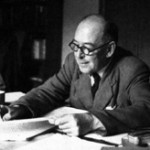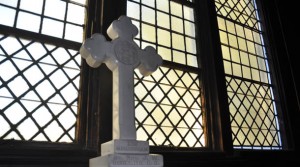 C.S. Lewis is the greatest Anglican apologist of the 20th century. C.S. Lewis was born in Ireland in 1898. His mother died when he was nine, and at age fifteen he became an atheist. Lewis eventually became a professor of English Literature at Oxford and in 1931 converted to Christianity. He wrote a number of influential Christian works including Mere Christianity, The Screwtape Letters, and The Great Divorce. He also wrote the famed children’s series The Chronicles of Narnia.
C.S. Lewis is the greatest Anglican apologist of the 20th century. C.S. Lewis was born in Ireland in 1898. His mother died when he was nine, and at age fifteen he became an atheist. Lewis eventually became a professor of English Literature at Oxford and in 1931 converted to Christianity. He wrote a number of influential Christian works including Mere Christianity, The Screwtape Letters, and The Great Divorce. He also wrote the famed children’s series The Chronicles of Narnia.
While C.S. Lewis was a member of the Church of England, he was not specifically an Anglican apologist. In Mere Christianity he writes of Christianity being a hall, out of which open several rooms, namely different understandings of Christianity. Lewis saw his role as bringing people from outside into the hallway, “If I can bring anyone into that hall I shall have done what I attempted.” (Mere Christianity, xv) Lewis’ approach to apologetics, however, strikes a particularly Anglican tone. He presents a theory for our consideration and if it helps our understanding of complex theological matters, fine. If not, we are free to consider something else. Lewis’ apologetic is fluid without sacrificing core belief.
Lewis died 47 years ago today, and his Feast Day is celebrated today in the Episcopal Church. From the 1979 BCP:
O God of searing truth and surpassing beauty, we give you thanks for Clive Staples Lewis, whose sanctified imagination lights fires of faith in young and old alike. Surprise us also with your joy and draw us into that new and abundant life which is ours in Christ Jesus, who lives and reigns with you and the Holy Spirit, one God, now and forever. Amen.
Welcome to the Anglican History Blog. As you may know, there is no shortage of blogs that comment on the current state of the Episcopal Church (TEC), Church of England (COE) and other members of the Anglican Communion. This blog is something different. Instead of focusing on the current state of affairs, we want to examine the rich history of Anglicanism, with the hopes of finding out how and why we came to where we are today.
Feel free to comment on these posts and share your insights. Much can be learned from our past and we look forward to the discussion.



Recent Comments